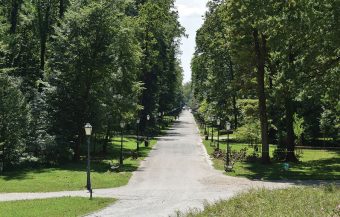Careful planning of the preservation of existing green areas and planting greenery in new areas is very important, especially for the urban environment. Greenery reduces air pollution, mitigates the effects of tropical heat, and increases resistance to floods and extreme weather events. Zagreb was one of the cities that demonstrated a strong commitment to such during the previous planting season when the city got 8,000 new trees.
Following the adoption of the Green Urban Renewal Strategy for the City of Zagreb, plans are in place for developing green infrastructure, achieving energy efficiency goals, adapting to climate change, and boosting resistance to risks. Zagreb’s commitment is also reflected in the city’s entry into the European Union’s Mission of 100 climate-neutral and smart cities, whereby the city government committed to drafting and implementing the Climate City Contract. This document reflects the political determination and vision of decarbonization in the city’s key sectors. It primarily refers to decarbonizing the built environment (buildings), traffic, (centralized) heating and cooling systems and related activities.
“The complete transformation of the planning and implementation process of decarbonization measures and adaptation to climate change is underway. Our goal is to include elements of decarbonization and adaptation in all city processes and key documents. We started the process by implementing higher energy efficiency standards, using renewable energy sources and incorporating adaptation elements into spatial plans”, explains Ana Pavičić Kaselj from the city’s office department for economic affairs, environmental sustainability and strategic planning.

Regarding waste management, the construction of the new facility in Resnik will ensure the processing of mixed municipal waste, bio-waste, paper, plastic, and metal is in line with the latest standards. Ms Pavičić Kaselj points out that the facility is a unique plant for mechanical-biological waste treatment (MBT) of the latest generation, completely closed, without releasing unpleasant odors and harmful emissions into the environment, which uses the best currently available technologies in the EU and includes a mixed waste processing plant and a sorting and composting plant.
IN FOCUS:
- MOL Group is a Leading Player in Creating a Green and Self-Sustaining Region
- OxyRePair – A Step Towards More Efficient Hydrometallurgy and Green Energy Storage
- Avala Tower – a More Energy-Efficient City Symbol
Energy efficiency and decarbonization of traffic
The energy rehabilitation of public buildings in Zagreb is carried out in line with a clearly established plan, all to save energy and reduce CO2 emissions by more than 50 per cent in each building. During the building renovation, economically viable and energy-efficient technologies, renewable energy sources, and environmentally friendly fuels are applied.
“The plan related to energy efficiency and renewable energy sources projects for public use, covering the period from 2024 to 2026, which the City Assembly adopted in December 2023, identifies the facilities that will be renovated to boost their energy efficiency as well as construction and extension of public purpose buildings. A budget of around 133,000,000 euros is planned for these projects this and the next two years”, adds Ms Pavičić Kaselj.
Regarding traffic decarbonization, the city’s priority is to make public city transport faster, more reliable, and more efficient, which will contribute to an increasing number of citizens using this type of transport over their vehicles. Although encouraging public urban transport alone will not completely and immediately solve the problem of motor vehicle exhaust gases, improving the quality and speed of urban public passenger transport is a sure and proven way to reduce air pollution and the number of vehicles on city roads.
Prepared by Milica Radičević
Read the whole story in the new issue the Energy portal Magazine AGROSOLAR ENERGY AND RES.



